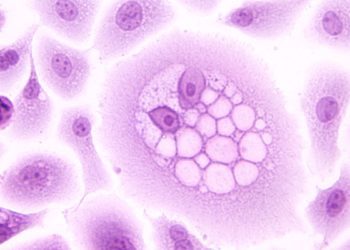Self-identified lesbians associated with decreased HPV vaccination
1. From a cross-sectional study of women aged 15-25 years, women who self-identified as lesbians and had heard of the HPV vaccine were less likely to have initiated vaccination than heterosexuals.
2. Women who did not report their sexual orientation, predominantly Latina immigrants of lower socioeconomic status, were significantly less likely to have heard of the vaccine than self-identified heterosexuals.
Evidence Rating Level: 2 (Good)
Study Rundown: All women are at risk of acquiring human papilloma virus (HPV), a virus that can cause cervical and other cancers. However, prior research has indicated that cervical cancer screening is less common among lesbian women than their heterosexual counterparts. This study investigated whether young American women’s sexual orientation was associated with either awareness of the HPV vaccine or initiation of vaccination. Among this study population, sexual orientation was not associated with awareness of the HPV vaccine. However, compared to heterosexual women, awareness was significantly lower among women who did not report sexual orientation; these women were predominantly Latina immigrants with low socioeconomic status. Although most were aware of the HPV vaccine, significantly fewer women who identified as lesbians had started the series of three vaccinations compared to their heterosexual counterparts. Notably, this study was limited by the use of self-reports of HPV vaccine awareness and initiation, and only included a small number of women who identified as lesbians. Furthermore, the study was unable to assess whether women who started the vaccine process completed the full series of HPV vaccines. Nevertheless, these results suggest that lesbian women may be less likely to initiate HPV vaccination, even if they are aware of the vaccine, indicating that they may be a key population to whom future education could be targeted.
Click to read the study, published today in the Annals of Internal Medicine
Relevant Reading: Reproductive Health Screeining Disparities and Sexual Orientation in a Cohort Study of US Adolescent and Young Adult Females.
In-Depth [cross-sectional study]: Currently, the Advisory Committee on Immunization Practices recommends HPV vaccination for all women and girls between 11-26 years of age. This study included data on self-reported sexual orientation, awareness of the HPV vaccine, and initiation of vaccination among US women and girls aged 15-25, using the 2006-2010 National Survey of Family Growth, a national probability sample of US women. Of 3253 women included, 84.4% had ever heard of the HPV vaccination and 28.5% had initiated vaccination. After adjusting for covariates, among women who had heard of the vaccine, lesbians were significantly less likely to have initiated vaccination than their heterosexual counterparts (8.5% vs. 28.4%, p = 0.007). In addition, women who did not report sexual orientation were significantly less likely to have heard about the HPV vaccine than their heterosexual counterparts (68.4% vs. 84.4%, p=0.004). There were no significant differences in either awareness or initiation of vaccination between women who identified as heterosexual and bisexual. Further research is needed to identify potential drivers of these disparities in HPV awareness and vaccination prevalence.
Image: PD
©2015 2 Minute Medicine, Inc. All rights reserved. No works may be reproduced without expressed written consent from 2 Minute Medicine, Inc. Inquire about licensing here. No article should be construed as medical advice and is not intended as such by the authors or by 2 Minute Medicine, Inc.







